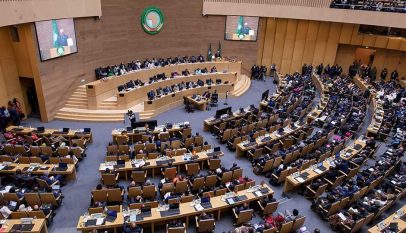Ethiopia extends state of emergency by four months

The Ethiopian parliament has extended by four months a state of emergency it declared six months ago after almost a year of often violent anti-government demonstrations.
The widely expected extension comes amid reports of continued violence and anti-government activities in some rural areas.
At least 500 people were killed by security forces during the year of protests, according to New York-based Human Rights Watch group – a figure the government later echoed.
“We still have some anti-peace elements that are active and want to capitalise on disputes that arise among regional states in the country,” Ethiopia’s defence minister, Siraj Fegessa, told MPs when he called on them to approve the extension on Thursday.
“In addition, some leaders of the violent acts that we witnessed before are still at large and are disseminating wrong information to incite violence.”
Opposition parties complain that the emergency powers are being used to clamp down on their members and activities, especially in rural regions far from the capital, Addis Ababa.
The state of emergency, declared on October 9, was a reaction to protests that were especially persistent in the Oromia region. Many members of the Oromo ethnic group say they are marginalised and that they do not have access to political power, something the government denies.
OPINION: The Oromo protests have changed Ethiopia
A wave of anger was triggered by a development scheme for Addis Ababa, which would have seen its boundaries extended into Oromia. Demonstrators saw it as a land grab that would force farmers off their land.
The protests soon spread to the Amhara region in the north, where locals argued that decades-old federal boundaries had cut off many ethnic Amharas from the region.
Crushed to death
The Oromo and Amhara ethnic groups together make up about 60 percent of Ethiopia’s population.
The country’s ruling coalition, which has been in power for a quarter of a century, is controlled primarily by the Tigray ethnic group, who make up six percent of the population.
Tensions reached an all-time high after a stampede in which at least 52 people were crushed to death fleeing security forces at a protest that grew out of a religious festival in the town of Bishoftu on October 2nd.
In the following days, rioters torched several mostly foreign-owned factories and other buildings that they claimed were built on seized land.
The government, though, blamed rebel groups and foreign-based dissidents for stoking the violence.
The state of emergency initially included curfews, social media blocks, restrictions on opposition party activity and a ban on diplomats traveling more than 40 kilometres outside the capital without approval.
Authorities arrested over 11,000 people during its first month.
Some provisions of the state of emergency were relaxed on March 15th, two weeks prior to Thursday’s announced extension. Arrests and searches without court orders were stopped, and restrictions on radio, television and theatre were dropped.
The post Ethiopia extends state of emergency by four months appeared first on African Media Agency.
Source: AMA








